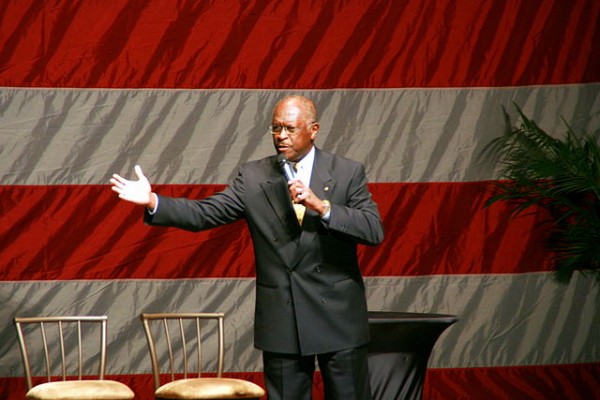Romney Could Learn From Former Competitor Herman Cain


There is no doubt that Mitt Romney's campaign over the past few weeks has been disastrous. Since the Democratic convention, weekly polls in key swing states have reflected that Romney has been steadily falling behind the president.
Romney's troubles have been caused by a combination of several factors: bad luck with the viral 47% video, his response to the Libya incident, and scathing criticisms from even the most conservative media pundits, including the Wall Street Journal's Editorial Page. If Romney wishes to become president, he needs to steer a new course, because his current route is heading towards the Republican's 2008 Electoral College numbers. A potential solution for Romney’s campaign may be to summon some tenets from an unusual place: former competitor Herman Cain.
During the Republican primary season, Mitt Romney proved that he was, relatively, more disciplined and electable than his contenders. This was especially evident in comparison with Herman Cain's turbulent campaign. However, what has turned out to be some of Romney's strongest criticisms -- likeability, policy vagueness, conviction -- is where Cain had been the strongest. This was, of course, before Cain’s campaign crumbled under the weight of sexual harassment allegations and foreign policy gaffes. Romney may want to buy a ticket to 'The Cain Train' and incorporate these five lessons from his former competitor.
1. Tax Policy: Mitt Romney has been criticized for not detailing his tax policy sufficiently. According to his website, Romney's tax plan consists of revoking the ‘Death Tax,’ reforming the tax code, reducing the corporate tax rate to 25%, and an "across-the-board 20 percent cut in marginal rates." However, where Romney has faced most criticism is in how he will generate revenue or what tax subsidies and deductions he would eliminate (such as the mortgage tax deduction credit or the higher education deductions).
Herman Cain never had a problem explaining his plan because it was simple: 9/9/9, or essentially a modified version of the FairTax plan. If Romney hopes to win the economic argument in the upcoming debates, then his plan needs to be simply packaged for Americans to digest. Otherwise, David Axelrod will just keep explaining Romney's plan for him.
2. Hitting the Circuits: One thing people respect about Herman Cain is his prowess for levity. Ever since becoming a national political figure, Cain has frequently appeared as a guest on liberal shows such as The Colbert Report, The Daily Show, and Real Time with Bill Maher, but he also appeared on the conservative shows such as Hannity and The O'Reilly Factor as well. This gave Cain exposure to a plethora of different voters -- expanding his profile and message.
Giving interviews to guys like Steven Colbert or making an appearance on Saturday Night Live would help Romney connect with voters in a multifaceted way. Showing the electorate an ounce of humility will help win any popularity contest, including the one for the presidency.
3. Pride with Being Unconventional: Herman Cain provided a staggering contrast when compared against his opponents in the Republican primary -- maybe even to a fault. However, Cain played well on the fact that he was a Washington D.C. outsider, a proud African-American conservative, and a successful businessman. Remaining vocal and proud of these features helped Cain contrast himself against a party that has been scrutinized for being sated with angry white guys (as Republican Senator Lindsey Graham put it).
Romney also has features that could help him standout when compared to previous presidential candidates. One of the most notable is that he is a member of The Church of Jesus Christ of Latter-day Saints -- AKA the Mormon church. Not only is this a historical moment for political scientists that research theology in politics; it is also groundbreaking for the Republican Party to nominate a candidate that is not a protestant Christian. Romney should embrace this new precedent, because it would help highlight an evolution within his party. This is a critical point to make if he wants to 'reel in' those swing voters that have been alienated by this years highly publicized debates on abortion and contraceptive access.
4. Get a Message: Everyone that followed the Republican primary debates this year remembers Herman Cain chirping 9-9-9 more times than a Southern Baptist preacher shouts 'amen' on Sunday. It was an easy message to repeat and understand. However, with just weeks left before the general election, Romney has yet to sell the electorate a campaign slogan that is 'catchy' or could be put on a bumper sticker. This is obviously a problem for a candidate with a moniker of 'flip-flopper'.
5. Fresh Policy: The 'fresh' factor Herman Cain possessed during the primary race was partially fueled by new policy perspectives that resonated with populist voters. An example was Cain's promise to veto complicated congressional bills, which he asserted are too lengthy and written in legal language that disenfranchises the average American from being able to read and comprehend at the dinner table (such as the 2000+ page Affordable Health Care Act).
If Romney followed suit and started laying out some fresh ideas, it would give the pundits something new to talk about -- moving the media away from his recent blunders and making this race competitive again.



